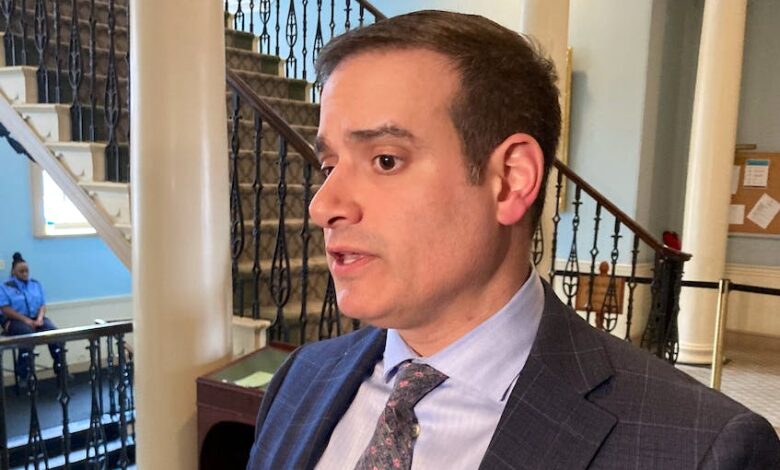‘Enforce the laws’: N.S. Liberals to feds, province on lobster dispute

As the conflict over Sipekne’katik’s moderate livelihood fishery once again heats up in St. Marys Bay, the provincial Liberal party has split from its federal counterparts.
On Tuesday, Nova Scotia Liberal Leader Zach Churchill called for the provincial government to start revoking the licences of any buyers found to be purchasing lobster caught without a licence issued by the federal Department of Fisheries and Oceans.
And he called out the federal government for a lack of enforcement of the Fisheries Act.
“(The provincial government) are fining (buyers) instead of getting rid of licences,” Churchill said.
“We are talking about hundreds of thousands or millions of dollars of lobster being landed illegally. There has to be a disincentive. … DFO also has to enforce the laws of the land which prohibit large-scale poaching.”
While DFO won’t comment on its enforcement strategies, it has appeared to pursue a policy of not charging First Nations members for fishing without commercial licences but instead seizing fishing gear when they are not present.
Under the federal Liberal government, a series of fisheries ministers have overseen widespread unlicensed fishing of species such as lobster and juvenile American eel by Mi’kmaw claiming assertion of a right to earn a moderate livelihood.
Asked about his apparent split from the federal arm of his party, Churchill responded, “I’m from that region. I know how critical that lobster industry is to our economy and our communities. I know what’s happening on St. Marys Bay isn’t right.”
Churchill joined commercial fishermen in saying that a widespread unlicensed lobster fishery is being pursued on St. Marys Bay by the Sipekne’katik First Nation.
St. Marys Bay falls into a region on Mi’kmaw maps called Kespukwik, which is governed by the local Bear River, Annapolis and Acadia First Nations.
Those three First Nations have over recent years exercised their moderate livelihood rights under an “understanding” with DFO that sees them allocated 3,500 traps. The band councils issue licences to their members to fish these traps during the commercial season, subject to the same rules and enforcement as non-aboriginal fishermen.
In exchange, the First Nations members can sell their catch.
DFO has been buying up commercial licences to make room in the lobster fishery for these moderate livelihood agreements, which it began pitching to First Nations after the issue blew up in 2020.

Each First Nation also has separate commercial fishing licences provided by DFO that it can fish itself or lease out, and food, social and ceremonial licences under which they can catch fish for community use but not for sale.
Sipekne’katik First Nation, located in Hants County, has refused to sign onto DFO’s offer of a similar moderate livelihood agreement, arguing that the Supreme Court of Canada affirmed its right to manage its own fisheries under its Marshall decisions.
What exactly is on offer to Sipekne’katik hasn’t been released, but previously DFO had been offering the community 10 moderate livelihood licences for 50 traps each.
That would be on top of the following commercial licences provided by DFO to Sipekne’katik: 15 lobster licences, 10 scallop licences, 10 swordfish licences, four clam licences, nine herring/mackerel licences, two snow crab licences, one gaspereau licence, one tuna licence and one groundfish licence.
Sipekne’katik has open tenders on its website for the lease of five of its LFA 34 commercial lobster licences (which includes St. Marys Bay), its two LFA 33 commercial lobster licences, a swordfish licence and four bluefin tuna tags.
While neither Chief Michelle Glasgow nor lawyer Michael McDonald responded to requests for comment, the details of the band’s position can be found in a lawsuit filed by Sipekne’katik against DFO in July.
“The plaintiffs assert their aboriginal right to have a priority in all fisheries was also affirmed by a number of Supreme Court of Canada decisions, including but not limited to: Sparrow, Badger, Fox and Nikal,” reads Sipekne’katik’s statement of claim.
“In accordance with these Supreme Court of Canada decisions, which is the highest court in Canada, aboriginal treaty rights MUST take PRIORITY over any commercial fisheries allocation.”
Sipekne’katik filed the suit against both DFO and the Canadian Coast Guard in July after fisheries officers hauled and seized lobster traps belonging to two of its community members just off the Saulnierville wharf.
In its R vs. Marshall and subsequent clarification known as Marshall II, the Supreme Court of Canada ruled that Mi’kmaw and Maliseet have a treaty right to fish for a “moderate livelihood,” but did not defnine that term.
The court also stated that the right is a regulated one, and the regulator is the federal fisheries minister.
“The paramount regulatory objective is conservation and responsibility for it is placed squarely on the minister responsible and not on the aboriginal or non‑aboriginal users of the resource,” reads R vs. Marshall.
“The regulatory authority extends to other compelling and substantial public objectives which may include economic and regional fairness, and recognition of the historical reliance upon, and participation in, the fishery by non-aboriginal groups. Aboriginal people are entitled to be consulted about limitations on the exercise of treaty and aboriginal rights. The minister has available for regulatory purposes the full range of resource management tools and techniques, provided their use to limit the exercise of a treaty right can be justified on conservation or other grounds.”
Churchill argues that the provincial government should use its ability to revoke buyers’ licences from fish processors who purchase lobster from harvesters who don’t have DFO-issued licences.
“Previously when (the moderate livelihood fishery) heated up in 2012, we put in place a zero tolerance for the purchase of illegal lobster,” Churchill said.
“If caught, (a buyer) lost their licence. That helped create a major disincentive to not create a big market for illegal lobster. (Provincial Fisheries Minister) Steve Craig has backed down on that. They’re being much more lenient now, and this is exacerbating the situation on St. Marys Bay.”
For its part, the provincial Department of Fisheries and Aquaculture issued a written response.
“Since the issue of a moderate livelihood fishery first arose, we have consistently encouraged the federal government and Mi’kmaq of Nova Scotia to continue the important dialogue about what constitutes a moderate livelihood fishery,” the statement reads.
“This is a responsibility of the federal government, but we expect them to do it in a way that respects conservation, the rights of Mi’kmaq people, and the interests of others in the fishery.”
The department acknowledged it has the ability to revoke a buyer’s licence and pointed to a single case three years ago where a licence was revoked after a buyer was convicted for a Fisheries Act violation.




